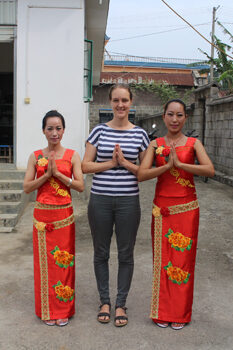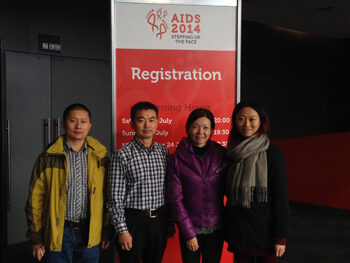ABM Archive Website
THIS WEBSITE CONTAINS ARCHIVE MATERIALS FOR HISTORICAL REFERENCE ONLY
For up-to-date information, including our latest appeals, news, and resources, please visit our current website.
Update: China HIV Prevention & Health Care
 |
| Isabel with local villagers, Mei and Ying. |
Isabel Robinson, ABM’s China Program Coordinator, spoke about her trip to China in May 2014 to meet with Amity Foundation staff.
“This year ABM is supporting a new project in China through the Amity Foundation which is focused on people living with HIV (PLHIV). It’s in the Nanjing province which is in the western China, which is where we’ve been previously supporting the Ethnic Women’s Health project … in some villages on the outskirts of Jiangsu.”
“We visited the HIV Clinic at the Jiangsu Hospital where a lot of the patients go for treatment, and our project fund is supporting treatment of people with HIV. If they get any kind of infection or illness related to having HIV, then some support comes from the Government and some from ABM.”
Whilst Isabel was at the clinic, she met a man who was quite ill. He was happy to talk about his situation and said he had a urinary infection but the doctor said he was getting better. She found it quite sad and confronting to meet someone in his situation.
ABM helps to fund the HIV care and support groups which work with PLHIV, building them up and enabling them to earn a proper income. The project also includes cultural training, medical check-ups, training for local health workers, and working with the general community to create more awareness of the disease and to reduce the stigma associated with HIV.
Isabel said the aim of HIV awareness campaigns was “getting local leaders and women’s groups to know more about HIV, how it is and isn’t passed on, so they no longer need to be afraid of sharing food or anything that’s HIV positive. Then they know they are not going to contract HIV via these means, only through sex and sharing needles.”
“We met a lot of the health workers that are being trained and some of the local community members, and one of the highlights was going to a cultural performance. The people in this area are a different ethnic group and they have their own language.”
“One of the women in this HIV support group, who is HIV positive, used to be a very keen dancer and performer but when she got HIV, she said she felt too ashamed and she didn’t want to perform anymore. Through the group she became more confident, and the local community now know that it is okay to spend time with her. She’s gone back into the group and so this is like the first time she’s performed in public for several years. She was really proud. She danced beautifully.”
 |
| L-R Amity staff Chen Ming, He Wen, Helen Zhao and Liu Chang. |
In July ABM supported staff members from the Amity Foundation to attend the 2014 AIDS Conference in Melbourne. They were Chen Ming (Amity Partner Office staff from Chongqing), He Wen (Assistant to General Secretary and Director of Project Management Centre), Helen Zhao (Director of Education and International Exchange Division) and Liu Chang (Project Officer). During that time they also attended the Interfaith Pre-Conference event, and spoke about Amity’s work at a couple of local Anglican parishes, prior to the conference.
When asked about the conference, He Wen said, “Actually the conference, I think it provides opportunity for us to hear what are the people are doing and much more. Actually we have a big hope, much more is we hope next time we can have opportunity to share what Amity is doing because we think according to the Chinese contacts, we are doing something which prove is very effective. So we want to share with more people what we are doing in China, not only just listen and to learn.”
About Amity’s work with PLHIV, He Wen says, “We think HIV/Aids is not only a medical issue. It relates to political, social work and also psychology, mental and everything. That’s why Amity’s approach is … a holistic approach. It’s integrated with quite a community-based HIV/Aids prevention work.”
“Our final goal is we hope we can set up a mechanism which can prevent any encounter of the disease. Because when people can have a positive life or have happy lifestyles, any kind of disease they can prevent from this community. So this is much more important than just do simple treatment. The keyword is training (for prevention).”
< Back


